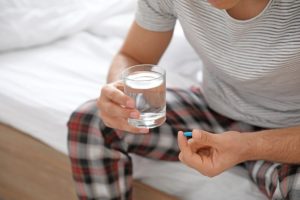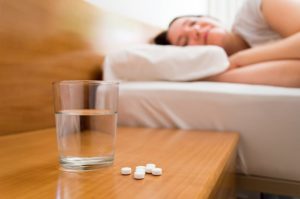Sleep Vitamins
Vitamins play an important role in sleep health, yet a substantial number of people obtain fewer vitamins than they need from their diet. Sleep vitamin supplements are designed to compensate for vitamin deficiencies and help restore a healthy balance.
We examine how vitamins affect the sleep-wake cycle and discuss who should consider taking vitamins for sleep.
Are You Getting Enough Deep Sleep?
A variety of issues can cause degrade your sleep quality. Answer three questions to understand if it’s a concern you should worry about.
What Are Sleep Vitamins?
Vitamins are a group of natural substances that are needed by the body. To be healthy, people need to have sufficient levels of vitamin A, C, D, E, K, and the B vitamins. Each vitamin plays an important role in maintaining brain and body functioning.
Although each vitamin completes multiple functions, people may use the term sleep vitamins when talking specifically about vitamins known for their contributions to sleep.
What to Look For in a Sleep Vitamin
People exploring sleep vitamins should consider their personal health needs. Unlike sleep aids that are separate from the diet and added to enhance sleep, sleep vitamin supplements are only really necessary when someone has low levels of that vitamin.
There is currently a limited offering of sleep vitamins on the market. Vitamin supplements may be sold on their own, sold as a multivitamin, or packaged together with other natural sleep aids such as magnesium, l-theanine, or melatonin.
The safety and efficacy of supplements is not closely monitored by the U.S. Food and Drug Administration (FDA). Shoppers should take additional measures to make sure they are purchasing reputable products.
The Best Sleep Vitamins
Research suggests that vitamins C and D, and B vitamins may be essential for maintaining healthy sleep patterns. Vitamins E, A, and K may play a smaller, but still important, role.
Vitamin D
Best known for contributing to bone health, vitamin D is also involved in areas of the brain that control the sleep-wake cycle . People’s bodies create most of their vitamin D in response to sunlight reaching the skin, with small amounts also coming from food and supplements.
Because of its connection to daylight, vitamin D may help regulate sleep timing and is thought to directly impact levels of melatonin, the sleep hormone. Vitamin D may also be involved in regulating other genes and substances that affect the sleep-wake cycle.
B Vitamins
B vitamins, including vitamins B3, B6, B9, and B12, may directly or indirectly affect sleep hormones . Additionally, people with a deficiency in vitamin B1 or vitamin B2 may notice fatigue and sleep problems , among other symptoms.
Vitamin B12 is involved in the process of creating melatonin , the hormone that helps control sleep. Preliminary research suggests that a lack of vitamin B12 may be linked to short sleep, trouble sleeping, and excessive daytime sleepiness.
Vitamin B6 may benefit people with insomnia , a disorder that involves trouble sleeping. Vitamin B6 supplements may also improve sleep quality and decrease symptoms of restless legs syndrome, a sleep disorder that can keep people awake with an irresistible urge to move the legs.
Vitamin C
Vitamin C is an antioxidant that helps counteract oxidative stress . Oxidative stress occurs when unstable molecules build up in the body, potentially causing damage to healthy cells and tissues.
Poor sleep can contribute to higher levels of oxidative stress, and too much oxidative stress can also exacerbate sleep problems . Antioxidants, like vitamin C, may help control levels of oxidative stress, and in turn, optimal levels of oxidative stress promote healthy sleep .
Symptoms of certain sleep disorders may also be worse in people with high levels of oxidative stress. These disorders include restless legs syndrome and obstructive sleep apnea, a disorder characterized by lapses in breathing.
“If you struggle to sleep well on a consistent basis it is best to discuss with your doctor rather than self treat. Always consult with your healthcare provider before initiating a vitamin supplement for sleep.”
Dr. Abhinav Singh, Sleep Physician
Vitamin E
Recent studies have linked vitamin E deficiency with short sleep, though it is unclear if supplements help increase sleep duration. Vitamin E may also improve sleep quality due to its actions as an antioxidant.
Vitamin E may help reduce night sweats for people going through menopause, which are often disruptive to sleep. Supplements containing vitamins C and E have also been found to improve symptoms of restless legs syndrome and obstructive sleep apnea.
Vitamin A
Vitamin A and related compounds help with light detection in the eye. As a result, vitamin A may contribute to regulation of the sleep-wake cycle, with effects on sleep timing, sleep duration, and sleep quality .
People who consume less vitamin A and related compounds tend to go short on sleep. Supplements may help restore healthy levels of vitamin A, although these supplements can be harmful in high doses.
Vitamin K
Studies have linked low levels of vitamin K to short sleep and poor sleep quality. Low vitamin K may also co-occur with depression and oxidative stress, both of which can impact sleep .

What to Consider Before Taking a Sleep Vitamin
Although sleep vitamins tend to have fewer side effects than pharmaceutical sleep aids, they may not be appropriate for everybody.
Some vitamin supplements may have undesirable consequences or negatively affect sleep quality when taken in larger amounts. Before taking vitamins for sleep, talk to your doctor to see if there is a better way to address sleep problems or a vitamin deficiency.
Medical Disclaimer: The content on this page should not be taken as medical advice or used as a recommendation for any specific treatment or medication. Always consult your doctor before taking a new medication or changing your current treatment.

Still have questions? Ask our community!
Join our Sleep Care Community — a trusted hub of sleep health professionals, product specialists, and people just like you. Whether you need expert sleep advice for your insomnia or you’re searching for the perfect mattress, we’ve got you covered. Get personalized guidance from the experts who know sleep best.
References
14 Sources
-
Fairfield, K., Tangney, C., & Rosenson, R.. (2022, November 2). Vitamin intake and disease prevention. In D. Seres & D. Gersh (Ed.). UpToDate., Retrieved May 18, 2023, from
https://www.uptodate.com/contents/vitamin-intake-and-disease-prevention -
A.D.A.M. Medical Encyclopedia. (2015, April 2). Vitamins. MedlinePlus., Retrieved May 18, 2023, from
https://medlineplus.gov/vitamins.html -
Lee, H. J., Choi, H., & Yoon, I. Y. (2020). Impacts of serum vitamin D levels on sleep and daytime sleepiness according to working conditions. Journal of clinical sleep medicine : JCSM: official publication of the American Academy of Sleep Medicine, 16(7), 1045–1054.
https://pubmed.ncbi.nlm.nih.gov/32108568/ -
Huiberts, L. M., & Smolders, K. C. H. J. (2021). Effects of vitamin D on mood and sleep in the healthy population: Interpretations from the serotonergic pathway. Sleep medicine reviews, 55, 101379.
https://pubmed.ncbi.nlm.nih.gov/32987320/ -
Ikonte, C. J., Mun, J. G., Reider, C. A., Grant, R. W., & Mitmesser, S. H. (2019). Micronutrient Inadequacy in Short Sleep: Analysis of the NHANES 2005-2016. Nutrients, 11(10), 2335.
https://pubmed.ncbi.nlm.nih.gov/31581561/ -
Johnson, L. (2022 November). Thiamin Deficiency. Merck Manual Professional Version., Retrieved May 18, 2023, from
https://www.merckmanuals.com/professional/nutritional-disorders/vitamin-deficiency,-dependency,-and-toxicity/thiamin-deficiency -
Hysing, M., Strand, T. A., Chandyo, R. K., Ulak, M., Ranjitkar, S., Schwinger, C., Shrestha, M., & Kvestad, I. (2022). The effect of vitamin B12-supplementation on actigraphy measured sleep pattern; a randomized control trial. Clinical nutrition (Edinburgh, Scotland), 41(2), 307–312.
https://pubmed.ncbi.nlm.nih.gov/34999324/ -
Jadidi, A., Rezaei Ashtiani, A., Khanmohamadi Hezaveh, A., & Aghaepour, S. M. (2022). Therapeutic effects of magnesium and vitamin B6 in alleviating the symptoms of restless legs syndrome: a randomized controlled clinical trial. BMC complementary medicine and therapies, 23(1), 1.
https://pubmed.ncbi.nlm.nih.gov/36587225 -
National Institutes of Health, Office of Dietary Supplements. (2021, March 26). Vitamin C., Retrieved May 18, 2023, from
https://ods.od.nih.gov/factsheets/VitaminC-HealthProfessional/ -
Thongchumnum, W., Vallibhakara, S. A., Sophonsritsuk, A., & Vallibhakara, O. (2023). Effect of Vitamin E Supplementation on Chronic Insomnia Disorder in Postmenopausal Women: A Prospective, Double-Blinded Randomized Controlled Trial. Nutrients, 15(5), 1187.
https://pubmed.ncbi.nlm.nih.gov/36904186/ -
Otocka-Kmiecik, A., & Król, A. (2020). The Role of Vitamin C in Two Distinct Physiological States: Physical Activity and Sleep. Nutrients, 12(12), 3908.
https://pubmed.ncbi.nlm.nih.gov/33371359/ -
Ji, X., Grandner, M. A., & Liu, J. (2017). The relationship between micronutrient status and sleep patterns: a systematic review. Public health nutrition, 20(4), 687–701.
https://pubmed.ncbi.nlm.nih.gov/27702409/ -
Bhupathiraju, S. & Hu, F. (2023, February). Vitamins and Minerals. MSD Manual Consumer Version., Retrieved May 18, 2023, from
https://www.msdmanuals.com/home/disorders-of-nutrition/overview-of-nutrition/vitamins-and-minerals -
Zhang, Y., Tan, W., Xi, X., Yang, H., Zhang, K., Li, S., Chen, X., & Zuo, H. (2023). Association between vitamin K intake and depressive symptoms in US adults: Data from the National Health and Nutrition Examination Survey (NHANES) 2013-2018. Frontiers in nutrition, 10, 1102109.
https://pubmed.ncbi.nlm.nih.gov/37032783/






















